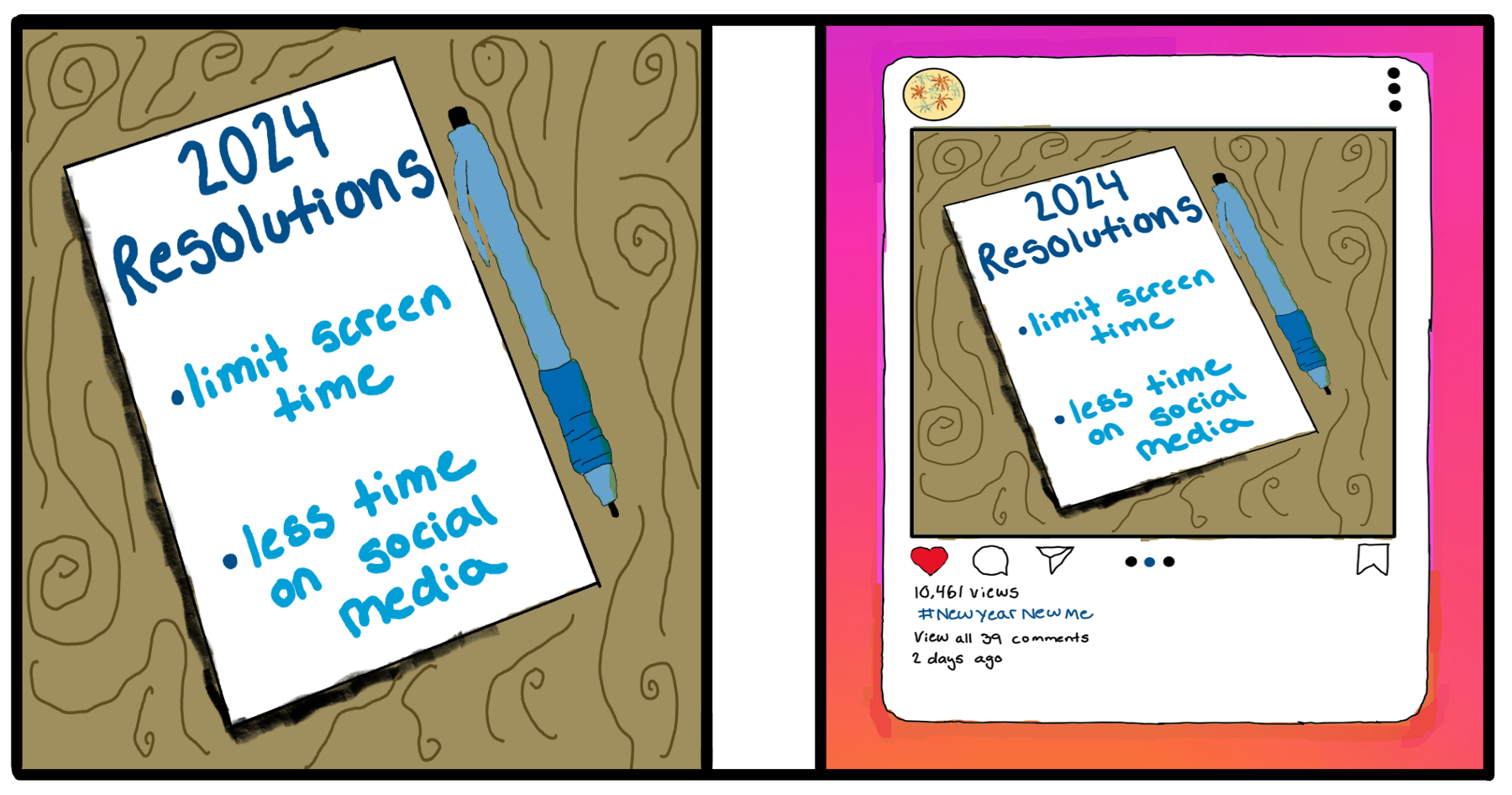Isabel Schimpff is a Contributing Writer for The Bugle. The opinions expressed here are solely his own and are not meant to reflect views of The Bugle staff or The Bolles School.
Stop setting your year up for failure!
Did you make a New Year’s resolution this New Year? If you did, you’re certainly not alone: over 73% of people in the US make resolutions every year according to the Forbes Health/OnePoll survey in 2023.
I hate to tell you, but deep down you probably already know over 90% of resolutions will fail within the next few months—80% of those don’t even make it until February.
Why are New Year’s resolutions so harmful? Well, I’m here to give you my unlicensed opinion on why we should stop making resolutions (but don’t worry, I did my research first).
First off, ask yourself the following questions: Why did you make your resolution? How attainable is that resolution? Did you set a goal for yourself because you truly wanted a lasting change in your life, or did you set a goal because it’s tradition and everyone around you was making them too?
The first issue with New Year’s resolutions lies within the motivation people have to make them in the first place. Forbes Health/OnePoll survey tells us that 61.7% of respondents say that they feel pressured to set a resolution each year. Is this really the best rationale for making a drastic change in your life? The poll also tells us that 66.5% of respondents say they plan on making three or more goals. Already, you feel pressured to make these goals that probably include a drastic change in your life, but now you’re planning multiple despite knowing they have a good chance of quickly failing. Why?
Of course, we romanticize the idea of January 1. It’s a chance for you to turn your life around, which is always appealing. It’s so intriguing because you’re not alone in attempting change, and we feel less threatened when tackling challenges with other people. Friends and family can help keep us accountable and on track to meet our goals. People are more understanding of changes in your life because it’s common for people to make goals at this time. While these all sound like great motivators, in reality, the people you surround yourself with will slowly start abandoning their own goals one by one until you feel justification for abandoning your resolutions too. Then life goes back to normal and the work you’ve put into the last month of your life becomes meaningless.
So why do we set ourselves up to fail again after years of defeat? I believe that it’s all because of how we are wired. As people, we are wired to jump on trends and continue traditions. It doesn’t really matter how practical or impractical they may seem, but when we see others doing something, we feel inclined to join in too. Think about it, it’s the only reason anyone still drinks eggnog at Christmas. We are also wired to be optimistic even in the face of evidence—hence why people buy lottery tickets.
I’m not saying we shouldn’t try to change. Some people definitely have admirable goals. If you have stuck with a resolution that has improved your life, all the more power to you! I just think there are better ways to go about making those improvements. Change is hard, it’s a fact of life. So when you make a change in your life, you should be emotionally prepared to make those changes, or they won’t stick. There isn’t a magic switch that goes off at 12 am on January 1 that allows you to be ready for change. It has to come on your own time for you to be the most successful.
Terri Bly, a clinical psychologist, argues that in order for us to really change, the pain of not changing has to be greater than the pain of changing. For example, it’s so much easier to do your homework the morning it is due because you know that the consequence of not turning it in is greater than the consequence of not getting any sleep.
Most resolutions are not essential changes. I’d be willing to bet the goals you set for yourself fit into one of these three categories: the wish to stop doing something (having fast food often or running over curbs), the wish to stop avoiding something (getting rid of the trash in your room or not procrastinating your homework), or the wish to start doing something (running more, spending more time with your family). Most of these things would probably make your life better, but they aren’t crucial to your survival. Therefore, the pain of changing would be greater than the pain of not changing.
The last big reason I think we fail so easily is because we ignore the Stages of Change Model. This was a model developed by James Prochaska and Carlo DiClemente to help us understand the process of self-inflicted human change. The first four stages include contemplation, preparation, action, and maintenance. Many times when we make resolutions in January, the first three steps are skipped over. We expect to begin at the maintenance step. In doing so, we deprive ourselves of the proper preparation needed to succeed. The maintenance step is also often the longest of the entire process. When we change, we step outside our comfort zone and no one enjoys being uncomfortable.
Basically, this means you are thrusting yourself into the fourth and longest step of the Change Model, forcing yourself to be in a stage of discomfort for a long period of time in order to see lasting change. Then ironically, to top it all off, many resolutions include stopping many things that help us cope with the discomfort and stress in our lives, like stress-eating.
Once we abandon our resolutions, it sets a precedent for the rest of the year. It’s harmful to continue setting goals and then failing to meet them. Later in the year when we are finally prepared to make a change, we will think back to our New Year’s resolutions and become dismayed, losing hope of completing our new goals.
We all love the idea of a new beginning and a clean slate. It gives us room for our new mistakes and our new successes. So if we love new beginnings, let’s not ruin our next New Year with resolutions that guarantee our failure.




